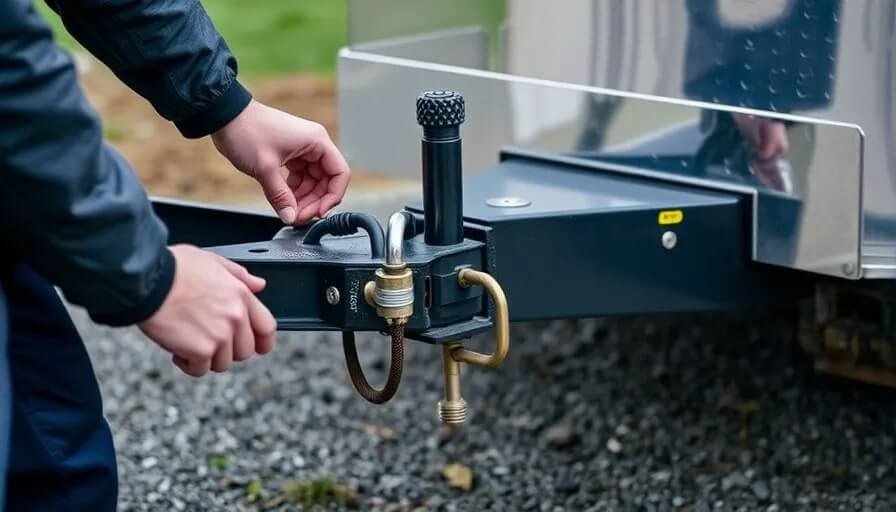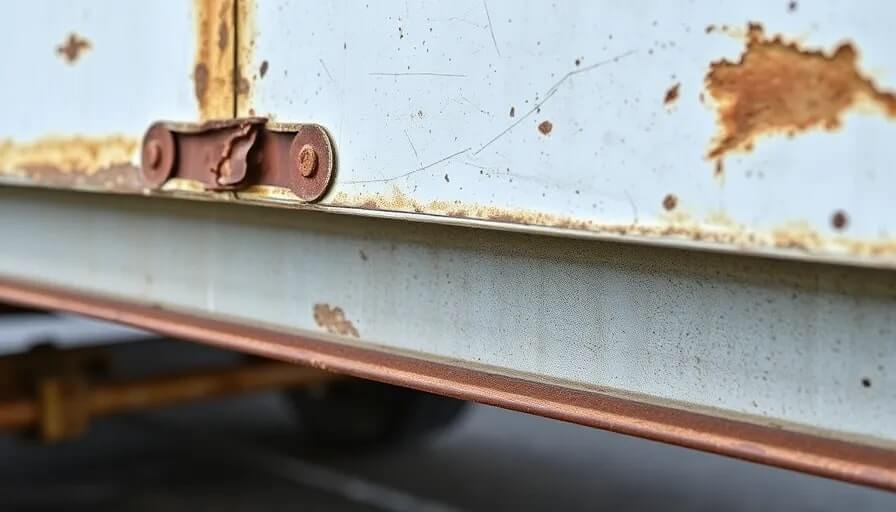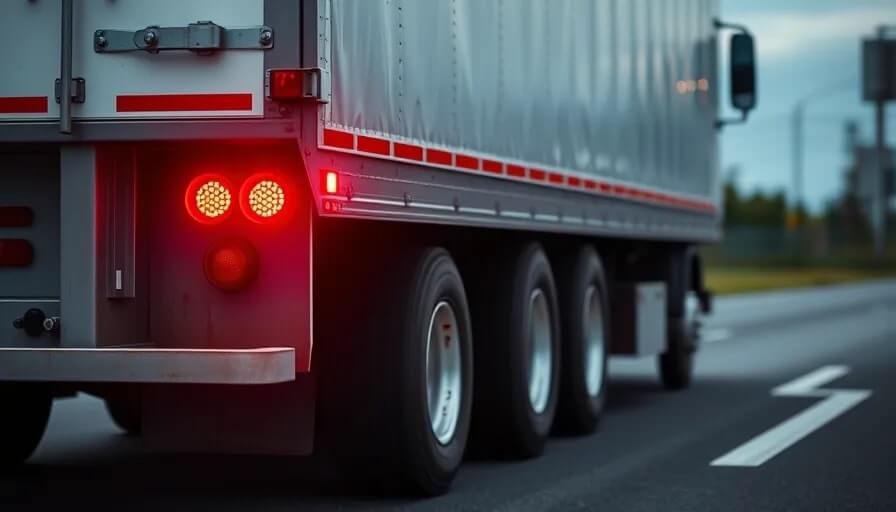

In today’s world, ensuring the safety and reliability of your trailer is paramount. Regular trailer inspections are essential if you use your trailer for transporting goods, recreational purposes, or any other reason.
These inspections help maintain the structural integrity of your trailer and ensure compliance with legal standards, thereby avoiding potential fines or accidents.
Understanding the intricacies of a trailer safety inspection can significantly enhance your ability to keep your trailer in optimal condition, providing peace of mind every time you hit the road.
This comprehensive guide is designed to walk you through everything you need about trailer inspection requirements. From understanding the fundamental components that need regular checks to preparing effectively for an inspection, we’ve got you covered.
Whether you’re a seasoned trailer owner or new to the world of trailers, this guide will equip you with the knowledge to conduct thorough inspections and maintain the highest safety standards.
We aim to empower you with the information necessary to keep your trailer safe, reliable, and compliant with all relevant regulations. Let’s explore the essential aspects of trailer inspections, ensuring you are well-prepared to maintain your trailer’s performance and safety.
To effectively manage and maintain your trailer, it’s crucial to understand what trailer inspections entail. A trailer inspection is a comprehensive assessment that evaluates various components of your trailer to ensure they meet safety and operational standards.
These inspections can be conducted for different types of trailers, including commercial, residential, and recreational models, each with unique requirements and focus areas.
Trailer inspections matter significantly because they help ensure your trailer is safe to operate on the road. Regular inspections can identify potential issues before they become serious problems, reducing the risk of accidents caused by mechanical failures or structural weaknesses.
Additionally, adhering to trailer inspection requirements is a legal necessity in many regions, helping you avoid hefty fines and penalties arising from non-compliance.
The frequency of trailer inspections varies depending on several factors, including the type of trailer, its usage, and the specific regulations in your area. For commercial trailers, inspections might be required more frequently, often monthly or quarterly, to ensure they’re always roadworthy.
Personal or recreational trailers have less stringent requirements, but regular checks are essential to maintain safety and performance. Understanding these aspects will help you stay compliant and keep your trailer in excellent condition.
Various vital components require careful examination to ensure safety and functionality during trailer inspections. One of the most critical areas is the brake system. A trailer safety inspection must thoroughly check all brake components, including brake pads, discs, and lines.
Inspecting these parts for signs of wear and tear is essential, as faulty brakes can lead to dangerous driving conditions. Ensuring that your brake system is in top condition helps maintain control over your trailer, especially during stops or sudden maneuvers.
Lighting and electrical systems are another vital aspect of trailer inspections. Functioning lights are a legal requirement and essential for visibility, especially at night or in adverse weather conditions.
During an inspection, check that all lights, including brake, turn signals, and marker lights, are operational and correctly positioned. Addressing electrical issues promptly can prevent accidents and ensure your trailer is visible to other road users.
Tires and wheels also play a significant role in the safety of your trailer. Inspecting tires for adequate tread depth and signs of damage is crucial, as worn or damaged tires can lead to blowouts or loss of control.
Also, ensure that your tires are properly inflated and the wheels correctly aligned. Proper tire maintenance enhances safety, improves fuel efficiency, and reduces the likelihood of costly repairs.
Finally, the structural integrity of your trailer must be assessed during inspections. This involves checking the frame for cracks, rust, or other damage that could compromise the trailer’s strength and stability.
Ensuring that the load is evenly distributed and that the trailer isn’t overloaded helps maintain its structural integrity, preventing potential failures that could lead to accidents or further damage.

Safety features are integral to ensuring that your trailer operates smoothly and safely. One of the primary safety features to inspect is the coupling and hitches. Ensuring that the connections between the trailer and the towing vehicle are secure is essential for preventing detachment during transit.
Inspecting the types of hitches you use and following specific inspection tips can help maintain a reliable and safe connection, reducing the risk of accidents caused by hitch failure.
Load security is another critical safety aspect that must be inspected. Properly securing your cargo prevents shifting or falling during transport, which can lead to accidents or damage to both the trailer and the goods being transported.
Using the right tools and techniques for load management, such as straps, tie-downs, and load bars, ensures your cargo remains stable throughout the journey. Regularly checking that all load-securement devices are in good condition and correctly applied is crucial to a trailer safety inspection.
Emergency equipment is also a necessary component of trailer safety. Depending on the regulations in your area, specific safety gear such as fire extinguishers, reflective triangles, and emergency brake systems may be required. Inspecting and maintaining this equipment ensures you’re prepared to handle emergencies effectively.
Regular checks and maintenance of these tools comply with legal requirements and enhance your ability to respond to unexpected situations, keeping you and others safe on the road.
Preparation is critical to a successful trailer inspection. Start by following a pre-inspection checklist to ensure that every aspect of your trailer is ready for evaluation.
This includes inspecting all critical components, such as brakes, lights, tires, and the structural frame, to identify and address any issues beforehand. A systematic approach to your inspection routine can help you catch potential problems early, making the inspection process smoother and more efficient.
Documentation and records are also necessary when preparing for a trailer inspection. Maintaining accurate records of all maintenance and repairs performed on your trailer provides proof of its upkeep and compliance with regulations.
These documents can include receipts, service logs, and inspection reports, which may be required during the official inspection process.
Keeping your documentation organized and easily accessible helps demonstrate that you have diligently maintained your trailer, which can expedite the inspection and reduce the likelihood of failing due to missing or incomplete records.
A clean and organized trailer can significantly impact the inspection outcome. Regularly cleaning your trailer makes it easier to inspect and helps you identify any hidden issues that may need attention.
Organizing your trailer by securely storing tools, equipment, and cargo ensures that nothing obstructs critical inspection points, allowing for a thorough and efficient review. A well-maintained trailer reflects your commitment to safety and can make a positive impression during the inspection process, enhancing your chances of passing effortlessly.

Avoiding common mistakes during trailer inspections ensures a thorough and effective evaluation. One prevalent error is overlooking minor issues, which can escalate into significant problems if not addressed promptly.
Small cracks in the frame, minor electrical issues, or slight wear on brake components may seem insignificant initially, but ignoring them can lead to more severe damage or safety hazards over time. Ensuring that you address every issue, no matter how minor, is crucial for maintaining your trailer’s integrity and safety.
Improper load securing is another common mistake that can have serious consequences. Failing to secure your cargo correctly can result in shifting or falling loads during transit, increasing the risk of accidents and damage to your trailer or other vehicles.
It’s essential to follow best practices for load management, such as using appropriate tie-downs, ensuring even weight distribution, and regularly checking load-securement devices during your journey. Properly managing your load enhances safety and ensures compliance with transportation regulations.
Neglecting regular maintenance is a mistake that can lead to many problems during inspections. Infrequent checks and maintenance tasks can result in undetected wear and tear, leading to unexpected failures or the need for costly repairs.
Establishing a consistent maintenance schedule helps you stay on top of your trailer’s condition, ensuring that all components function correctly and that potential issues are addressed promptly. Regular maintenance not only prolongs the lifespan of your trailer but also ensures that it remains safe and reliable for every trip.
Navigating the complex landscape of trailer inspection requirements involves understanding federal and state regulations governing trailer safety and compliance. Federal regulations establish baseline standards for your trailer safety inspection checklist, ensuring all trailers meet essential safety criteria.
These regulations cover critical aspects such as braking systems, lighting, tires, and load securement, providing a uniform framework that trailer owners must adhere to nationwide. Familiarizing yourself with these federal guidelines is the first step in ensuring your trailer remains compliant and safe for the road.
However, state regulations can vary significantly, adding another complexity to trailer inspections. Each state may implement specific requirements regarding inspection intervals, permissible trailer weights, and additional safety features.
For example, some states mandate more frequent inspections for commercial trailers than personal ones or require specific documentation and record-keeping practices.
To ensure full compliance, it’s crucial to research and understand the regulations specific to your state. This knowledge will help you answer common questions like “Where can I get my trailer inspected?” by knowing the approved inspection stations and adhering to local laws.
Understanding the differences between commercial and personal trailer inspections is also vital. Commercial trailers are typically subject to more stringent inspection requirements due to their higher usage and the potential impact on road safety.
These inspections may include more detailed checks and the necessity for periodic re-inspections to maintain compliance. On the other hand, while still required to meet safety standards, personal trailers may have less frequent inspection schedules and different compliance criteria.
Knowing where to get a trailer inspected that meets federal and state requirements ensures you avoid potential fines and legal issues. Failing to comply with trailer inspection requirements can result in significant penalties, including fines and legal consequences.
Non-compliance can also affect your insurance coverage, potentially leading to increased premiums or denied claims in the event of an accident. Therefore, understanding where to get a trailer inspected and ensuring your trailer passes these inspections is crucial for legal compliance, protecting your investment, and enhancing overall road safety.
By staying informed about federal and state regulations and knowing exactly where to get a trailer inspected, you can confidently maintain your trailer’s safety and operational standards, ensuring peace of mind every time you travel.

Regular trailer inspections offer numerous benefits that go beyond mere compliance with regulations. One of the primary advantages is enhanced safety. By conducting frequent inspections, you significantly reduce the risk of accidents caused by mechanical failures or structural issues.
Ensuring that all components, from brakes to tires, are in optimal condition protects you and other road users, providing peace of mind whenever you travel with your trailer.
Another significant benefit is cost savings. Routine inspections enable you to pinpoint and tackle minor issues before they become major, expensive repairs. Early detection of problems can prevent expensive breakdowns, prolong the lifespan of your trailer’s components, and minimize the need for emergency repairs.
This proactive maintenance approach saves money and reduces the likelihood of unexpected downtime, ensuring your trailer remains reliable and functional for extended periods.
Improved performance is another crucial advantage of regular trailer inspections. A well-maintained trailer operates more efficiently, ensuring smooth and reliable performance during transport.
Properly functioning brakes, tires, and electrical systems contribute to better handling, stability, and overall functionality. This can lead to a more comfortable and efficient driving experience, reducing fatigue and enhancing your ability to transport goods or equipment safely and effectively.
Furthermore, regular inspections contribute to maintaining the resale value of your trailer. A trailer with a well-documented maintenance history is more attractive to potential buyers, as it demonstrates that the vehicle has been well cared for and is in good working condition.
This can result in a higher resale price and a quicker sale, providing additional financial benefits should you decide to upgrade or replace your trailer.
Taking your trailer inspections to the next level involves incorporating advanced strategies and tools that enhance the efficiency and thoroughness of your inspections. One such strategy is using technology to streamline the inspection process.
There are various tools and apps available that can help you conduct detailed inspections more efficiently. Digital inspection reports, for example, can simplify the documentation process, allowing you to track maintenance activities and inspection results over time.
These digital tools can also facilitate easier sharing of inspection data with professionals or regulatory bodies, ensuring that all necessary information is accurately recorded and easily accessible.
Training and education are also crucial for conducting adequate trailer inspections. Staying informed about the latest best practices in trailer maintenance and inspection ensures you know how to identify and address potential issues.
Participating in training programs, attending workshops, or accessing online resources can enhance your understanding of trailer components and their maintenance requirements. Being well-educated in these areas enables you to perform more accurate and comprehensive inspections, ultimately improving the safety and reliability of your trailer.
Partnering with professionals is another advanced tip that can significantly enhance trailer inspections. While regular inspections can be performed independently, seeking expert help for more complex issues ensures that your trailer is thoroughly evaluated and maintained to the highest standards.
Professional inspection services offer specialized knowledge and experience, providing a deeper level of scrutiny that can identify issues you might overlook. Additionally, professionals can provide valuable advice on maintenance practices and necessary repairs, helping you maintain your trailer in optimal condition.
Incorporating these advanced tips into your trailer inspection routine can lead to more effective and efficient maintenance practices. Utilizing technology, investing in education, and leveraging professional expertise all contribute to a comprehensive approach to trailer maintenance, ensuring that your trailer remains safe, reliable, and compliant with all necessary standards.
When it comes to trailers that meet high standards, Millennium Trailers stands out as a leading distributor. Our wide selection includes race car haulers and custom-designed units, all built with quality in mind.
Our expertise in various trailer types underscores the importance of choosing a well-constructed trailer from the start. A quality trailer not only performs better but also simplifies the inspection and maintenance process.
While we don’t perform inspections, our knowledge of trailer construction and features can guide you in selecting a trailer that’s built to last and easier to maintain. This initial choice sets the foundation for smoother, more straightforward inspections throughout your trailer’s lifecycle.
Contact Millennium Trailers today and experience the exceptional service that sets us apart.
Millennium Trailers is your trusted partner for high-quality trailers at unbeatable prices. Serving all 50 states, we’ve delivered over 5,000 trailers nationwide.
Established in 1998, we’re a company dedicated to meeting your hauling needs with excellence. Whether it’s cargo trailers or custom living quarters, we provide a wide range of options to suit your requirements. Our knowledgeable and friendly team ensures a smooth buying experience with personalized assistance. Proudly offering competitive pricing, state-of-the-art designs, and easy financing options. Committed to customer satisfaction, we strive to simplify the process of finding your perfect trailer.
Choose Millennium Trailers for a reliable, customized solution that delivers quality and value for your investment.
Copyright 1998 – 2023 Millennium Trailers, Inc.